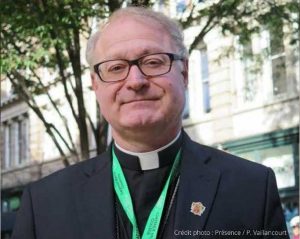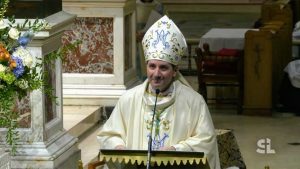— by Diocese Montreal
On the Feast of St. Luke the Evangelist, His Holiness Pope Francis accepted the resignation of Msgr, André Gazaille, 6th bishop of Nicolet, and appointed his successor, Msgr. Daniel Jodoin. At the time of the appointment, Msgr. Jodoin was bishop of the diocese of Bathurst in New Brunswick.
Msgr. Gazaille had been the bishop of Nicolet since September 11, 2011. He submitted his resignation to the Holy Father when he reached 75 years of age, as prescribed in the Code of Canon Law (Can. 401)
Msgr. Daniel Jodoin was born in Granby on March 2, 1957. Following his years of primary school at Saint-Luc school (1962-1969) and secondary school at the Séminaire du Verbe Divin in Granby (1969-1974), he studied at the Collège Jean-de-Brébeuf in Montréal (1974-1976) and the Université de Montréal’s École des Hautes Études commerciales, where he acquired a BA (1979) and an MBA (1982). Having passed the entrance examinations and completed a professional internship in a Montreal chartered accounting firm, he became a member of the Ordre des Comptables Agréés du Québec (CA) on November 6, 1981. Msgr. Jodoin joined the Missionnaires du Verbe Divin (Divine Word Missionaries) from 1982 until 1986, and entered the Séminaire Saint-Paul in Ottawa, where he received a BA in theology (1986). Following pastoral placements in various parishes in the dioceses of Saint-Hyacinthe and Sherbrooke, he was ordained a deacon on June 5, 1992 and priest for the archdiocese of Sherbrooke on October 3 of that same year. He studied at the Pontifical Gregorian University in Rome from 2000 to 2002 and received a licentiate in dogmatic theology, more specifically in ecclesiology. Msgr. Jodoin speaks English, French, Italian and Spanish, and is conversant in Latin and Greek.
Msgr. Jodoin exercised his priestly ministry in the following parishes in the archdiocese of Sherbrooke: as vicar for Saint-Joseph (1992-1994); parish priest for Notre-Dame-De-Lourdes, Saints-Anges de Ham-Nord et Saint-Fortunat (1994-2000); parochial administrator for Saint-Julien (1999-2000); parochial administrator and parish priest for Saint-François-d’Assise (2002-2009); parish priest for Très-Saint-Sacrement (2005-2006), Notre-Dame-de-l’Assomption (2005-2008). Sainte-Famille (2005-2009) and Saint-Philémon (2009). When the parishes were merged, Msgr. Jodoin became parish priest for the new Bon-Pasteur parish on January 1, 2010. Beginning in 2009, he was also head of the Office du clergé and coordinator of the pastoral region of Sherbrooke. In June 2002, he was appointed rector of the archdiocese of Sherbrooke’s Grand Séminaire des Saints-Apôtres.
On January 22, 2013, His Holiness Pope Benedict XVI appointed Msgr. Jodoin bishop of Bathurst, New Brunswick. His episcopal ordination took place on April 25, 2013, on the Feast of Saint Mark the Evangelist in Sacré-Coeur Cathedral in Bathurst.
The role of a diocesan Bishop
The diocesan Bishop is the chief teacher, sanctifier, and shepherd of God’s people. Most Bishops are given a diocese to govern spiritually, making sure the priests, deacons, pastoral workers and catechists in their diocese are preaching the Gospel and teaching sound doctrine to the flock. He is the principal teacher. The Bishop is the primary dispenser of all the sacraments. He has oversight of the liturgy.
He possesses the fullness of Orders, so that the fullness of Christ’s grace can flow through in sacramental form, to the sanctification of the faithful. Through his relationships with the priests of his diocese, the Bishop is able to shepherd the people of his diocese. The Bishops have been given a special outpouring of grace, to continue the work that the Apostles started. (Source: CCCB.ca)
— by Diocese Montreal
Radio CPAM was created to meet the urgent need for an intra-community communications service for Montreal’s Haitian population in the years following the Duvalier dictatorship, an era which saw the emergence of various weekend radio programs hosted by community stations.
It was generally believed that the fall of that dictatorship would bring about some meaningful change in the situation in Haiti. Unfortunately, the country’s misfortunes continued and in fact have persisted to this day. Weekend programming was simply no longer adequate for the needs of Montreal’s Haitian community.
Then, with the closure of several AM radio stations in the 1990s, it was possible to build a radio station for the city from the ground up, with an antenna and a 1,000-watt transmitter and comprising studios set up over a Kim Phat food store in Montreal’s east end. Finally, in 2013, the station received permission to increase transmission power to 10,000 watts.
CPAM’s mission is to operate an ethnic French-language radio station in Montreal providing programming that caters to the needs of French-speaking ethnic communities of Haitian, Latin-American and African backgrounds in the greater Montreal area.
For this great success, CPAM wishes to thank the Lord, who has allowed our mission to prosper for 20 years. In keeping with the solemnity of that wish, CPAM has called on Archbishop Christian Lépine to preside at a Eucharistic celebration to mark the occasion.
Your presence is important to us, and you are cordially invited to take part in this Mass with us:
On Sunday, October 16, 2022
At 2:30 p.m.
At Mary Queen of the World Cathedral, located at the intersection of René-Lévesque and Mansfield.
— by Diocese Montreal
“When a local Church welcomes a new bishop, is that good news?” asked Archbishop Christian Lépine of Montreal of the 1,500 faithful gathered in the capacity-filled Cathedral on the evening of Monday, September 12. Judging from the standing ovation received by the proclamation of the appointment and the applause that followed this question, yes, it is indeed good news! Msgr. Frank Leo is a diocesan priest in Montreal. He is Vicar General and Moderator of the diocesan Curia of Montreal, and possesses an impressive background.
He is warmly welcomed as Auxiliary Bishop of Montreal! His ordination completes the trio comprising Bishop Alain Faubert, Archbishop Christian Lépine and him.
But is it such good news for the interested party himself? The laughter and facial expressions in response to this question reflect the fact that this ministry is no sinecure. Archbishop Lépine went on, pointing out valid reasons why it is not good news. The new Auxiliary Bishop now becomes effectively bound: bound to the apostolic succession, bound to Jesus Christ in service and, like Him, bound to give of his life even to the death. Still, is it not good news to be at the service of the highest of causes out of love? To pray to and contemplate Jesus Christ alive and active among his people? To experience the twofold passion for Jesus Christ and for his Church? Isn’t the Church worth giving one’s life for?
Bishop Frank Leo’s answer to this election is “Yes.” In Biblical parlance, the election is God’s choice, and comes with the responsibility to act in his Name. According to ecclesial tradition, election is God’s choice, expressed through a complex process which, in the case of an auxiliary bishop, begins with a request from the local bishop and culminates with a decree issued by Pope Francis. This election, combined with the anointing which is part of the episcopal ordination, is enacted by the Holy Spirit, who forever thereafter imbues the personality of the one having received it.
As a sign of his acceptance of the election, Bishop Leo answered ‘Yes’ to the call spoken by Archbishop Lépine and the two bishops performing the ordination with him, Msgr. Serge Poitras and Msgr. Douglas Crosby. In accordance with the ritual, Bishop Leo prostrated himself, a symbolic allusion to the death and resurrection of Jesus Christ. The episcopal college forming a circle in front of the balustrade, the gentle embraces and laying on of hands, the beauty of the music and the singing, the prayerful and vocal participation of the faithful gathered together in spite of the heat – all these elements combined to confer on the moment and on the Eucharistic celebration a divine intensity.
Seated among the congregation were more than one hundred priests, some forty bishops, among whom were several of the Eastern rite and several Bishops Emeriti. The latter included Bishop Jude St-Antoine; Cardinal Gérald Cyprien Lacroix, Archbishop of Quebec; Representative of the Apostolic Nunciature Msgr. Antons Prikulis; Anglican Bishop of Montreal Mary Irwin-Gibson, and many other representatives of a wide diversity of faith communities; civil authorities and dignitaries including representatives of the diplomatic corps; men and women of consecrated life; relatives, friends, colleagues and many faithful from the Italian Canadian community. The liturgy included French, English and Italian, as well as a number of Latin chants. The ceremony was streamed on Salt + Light Media and can be viewed on the Montreal Diocese YouTube channel.
Bishop Leo spoke in conclusion. He expressed thanksgiving and praise, as well as heartfelt thanks to his family and the parishioners from his home parish of Notre-Dame-de-la-Consolata. He reaffirmed his commitment, with and like Our Lady, to bring Christ to the world. He asked that we pray for him.
If present circumstances endure, he will be well supported in accomplishing the mission!




